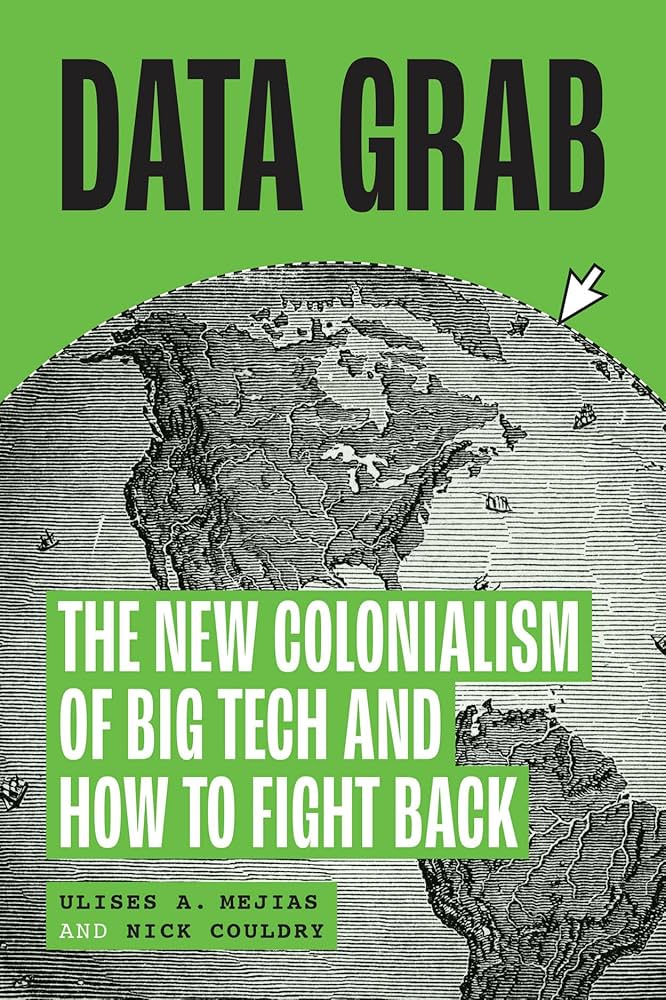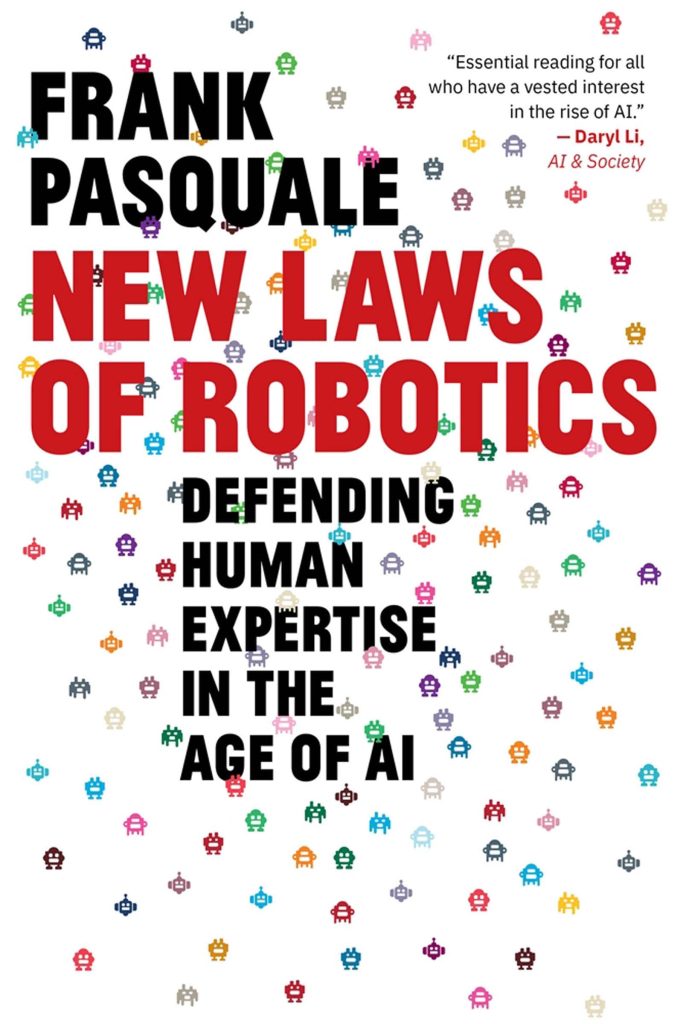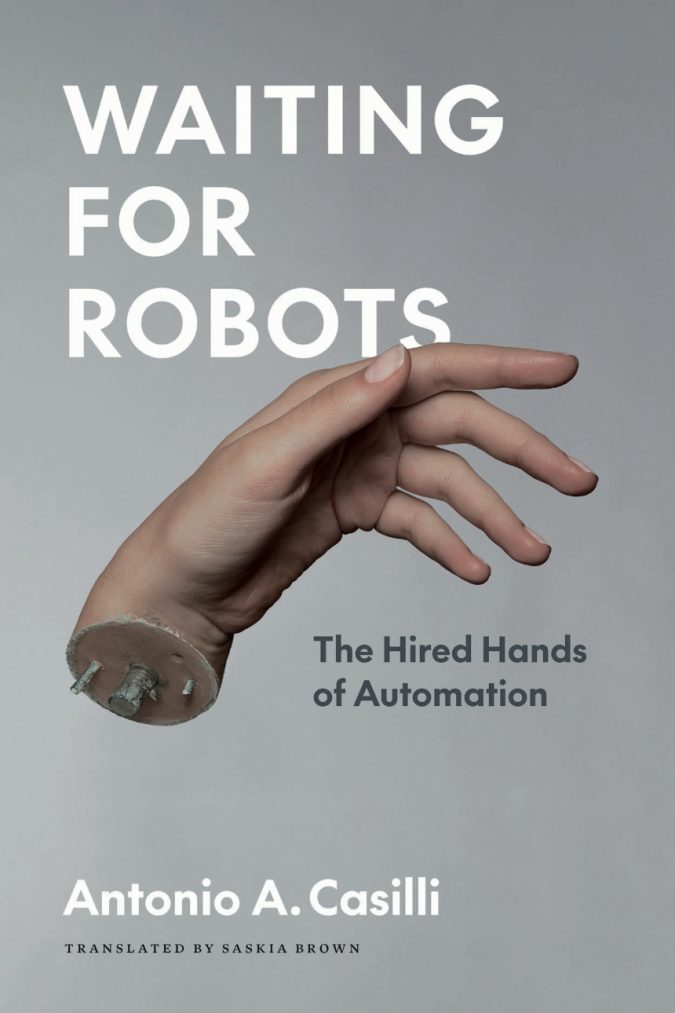I am excited to announce the publication of my new book Waiting for Robots: The Hidden Hands of Automation (University of Chicago Press, 2025) on January 8th. The journey of this book has been remarkable – since its initial French publication in 2019, it has found its way to readers in six different editions, from Spanish to Arabic to Italian. This new English edition arrives at a crucial moment, thoroughly updated to address generative AI, the lasting effect of global pandemics, evolving policy frameworks, and recent developments in worker organizing against platform exploitation. The timing couldn’t be more relevant, as debates about AI’s impact on labor grow increasingly urgent.
Building on years of research with my DiPLab team across Africa, Latin America, and Europe, this work adds a crucial dimension to existing studies of digital exploitation: it reveals how our everyday online activities are also connected to a global chain of digital labor.
In mapping this landscape, I show how content moderators earning minimal wages share the same space of exploitation with social media users unknowingly producing data. Platform workers delivering food are linked by an invisible thread to the users of the same algorithmically-driven apps. This intricate terrain reveals how both paid and unpaid human labor remains indispensable to technological systems, even as AI’s promise of automation obscures this complex web of human work.
“Waiting for Robots” challenges the prevalent myth that AI will replace human workers. Instead, I demonstrate how artificial intelligence requires and will continue to require human labor to function – even as this dependency is systematically obscured.
Media Coverage and Praise for Waiting for Robots

“US founding father Thomas Jefferson used dumbwaiters — small lifts that carry meals — during his extravagant dinners. There seemed to be no human intervention, but the lifts were operated by enslaved basement staff. As sociologist Antonio Casilli acutely observes, today too, artificial-intelligence systems are made to seem automated, often by overlooked and underpaid workers. His thought-provoking survey of robots highlights “the presence of inconspicuous labour in AI solutions”, hence its blunt subtitle, the Hired Hands of Automation.”—Nature, Book Review, 07 February 2025.

“Waiting for Robots makes a substantial contribution to the discourse on digital labor and platform capitalism. Casilli’s incisive analysis of the hidden human costs of AI, combined with his clear and engaging prose, establishes the book as essential reading for those seeking to understand the ethical and social dimensions of technology. By dismantling the conventional wisdom surrounding AI and exposing the labor that underpins it, Casilli offers a compelling framework for envisioning a more equitable and inclusive digital future.” —Science, Vol. 387, No. 6729

“Casilli’s pioneering book, now updated and available for the first time in English, completely upends the celebratory myths about AI. Through a quite remarkable range of international fieldwork, Casilli shows how exploited human workers, usually in the Global South, not only train AI, but often literally do the exhausting work branded as ‘artificial’ intelligence. A devastating portrait of the realities of the capitalist platform economy.” —Nick Couldry, London School of Economics and Political Science, coauthor of “Data Grab: The New Colonialism of Big Tech and How to Fight Back”

“Disturbing…. Artificial intelligence, according to its advocates, holds out the promise of an end to mind-numbing, exploitative work. Casilli… vehemently disagrees. He argues that it has merely changed the type of labor and the structure of the exploitation, and he has a mountain of research to support his case…. Casilli has identified a host of problems in the brave new world of AI, and perhaps this book can be a good place to start thinking about solutions. Revealing the dirty secrets of the AI revolution—and offering ideas for a path forward.” —Kirkus Reviews

“In Waiting for Robots, Casilli offers a sweeping exploration of digital labor, analogous to Melville’s meticulous chronicles of the whaling industry. Casilli takes readers on a provocative journey where human work is not disappearing but evolving in unexpected ways. With a blend of analysis and a subtly wry sense of humor, he debunks the myth of AI-driven job replacement, exposing how human labor is reconfigured and concealed within digital platforms. Bridging history, media, philosophy, and business, this page-turning work redefines our understanding of digital labor and underscores the enduring significance of human work. An indispensable guide for scholars and general readers alike.” —Trebor Scholz, New School, author of “Own This!: How Platform Cooperatives Help Workers Build a Democratic Internet”

“In this feisty manifesto, Casilli accuses the tech industry of using automation to exploit a growing digital workforce… Casilli’s sobering perspective makes clear that the dangers posed by AI are more mundane, if no less insidious, than commonly imagined, and the recommendation to implement a ‘universal digital income’—in which profits reaped by tech companies from monetizing user data are taxed and redistributed to the public—is bold and original. A troubling snapshot of the future of work, this unnerves.” —Publishers Weekly

“In this brilliant, important book, Casilli upends the standard Promethean narrative that AI is here to liberate humankind from dull, dirty, and dangerous work. He explores, instead, the opposite tendency: tech advances dependent on exploited and precarious labor. Grounded in the stories of delivery drivers, taskers, and microworkers condemned to piecework, and leavened by a sophisticated understanding of the political economy of automation, Waiting for Robots offers a compelling vision for a truly inclusive tech economy.” —Frank Pasquale, professor of law, Cornell University, author of “New Laws of Robotics: Defending Human Expertise in the Age of AI”

“Waiting for Robots, sweeping in its scope but exacting in its analysis, addresses the myriad, often hidden and unexpected ways AI is reconfiguring the nature of work, jobs, and labor worldwide. Written with verve and grace, Casilli’s account stands out as one of the most perceptive and critical accounts of AI that has come out in recent times.” —Gabriella Coleman, Harvard University, author of “Hacker, Hoaxer, Whistleblower, Spy: The Many Faces of Anonymous”

“This book arrives just in time: in a moment in which the collective has focused its greatest dreams, or deepest anxieties, depending on where you sit, on the imminent reordering of society under the regime of large language model–fueled natural language processing tools such as ChatGPT and other AI-based automation of all sorts…. As Casilli reminds us, the ‘digit’ of ‘digital labor’ refers to numbers, yes, but it also refers to the digits of the hand, leaving their fingerprints wherever they touch these technologies, as long as we know where, and how, to look.” —from the preface by Sarah T. Roberts, University of California, Los Angeles, author of “Behind the Screen: Content Moderation in the Shadows of Social Media”
